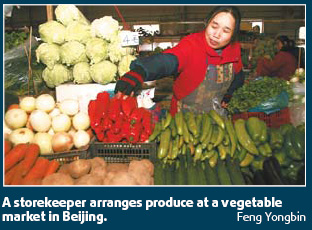Stimulus package supported
China's decision to continue with its economy-anchoring policies and balance trade will help the global recovery and address the world trade imbalance, say economists.
Delegates at the annual Central Economic Work Conference threw their support behind the country's economic stimulus and easy credit policies and vowed to make efforts to improve the quality of economic growth.
The conference is a gathering of high-ranking policymakers from the central government and its departments as well as provincial-level officials.
"Not mentioning any exit strategy serves as the best news for the world economy," said Zhang Xiaojing, senior economist with the Chinese Academy of Social Sciences' Institute of Economics.
The stimulus package is widely regarded as the reason why China has enjoyed a strong economic recovery during 2009 despite seeing a slump in exports.
Chinese leaders also said at the conference the country will continue with its moderately easy monetary policy. The policy, they said, will build in more flexibility and support the development of both the international and domestic economy.
"It is a very positive sign for the global economy, which is still facing some uncertainties in its recovery," Zhang said.
Meanwhile, China vowed to balance trade by "making efforts to increase imports" and by further expanding domestic demand.
"Which will help resolve the global trade imbalance," Zhang said.
Leaders said Chinese investors will also be encouraged to look for opportunities overseas.
Delegates decided at the conference that a proactive fiscal policy will be used to support more projects aimed at helping improve people's well-being in areas such as education, social security and environmental protection.
Monitoring inflation
While the country continues with its moderately relaxed monetary policy, it will also closely monitor inflation.
"The relationship between keeping stable and relatively fast economic growth and the management of inflation expectations should be dealt with properly," read a statement issued after the conference.
The government has pumped huge amounts of money into the economy this year to ensure an annual GDP growth rate of 8 percent. As a result, China's year-on-year economic growth will be about 8.3 percent this year before accelerating to 9.1 percent in 2010, the Chinese Academy of Social Sciences said in its economic outlook published yesterday.
In the first 10 months, new yuan loans have amounted to 8.9 trillion yuan ($1.3 trillion), compared with 4.2 trillion yuan for the whole of last year.
"The country will keep its monetary policy stable," said Zhang. "But if necessary, there will be some change."
If consumer price growth exceeds 5 percent and year-on-year GDP growth reaches 11 percent for two or three consecutive months, policymakers would certainly tighten money supply," said Lian Ping, chief economist with the Bank of Communications.
Policymakers, however, will remain cautious in the hope of stopping that from happening, Lian said.
"Chinese policymakers likely want to see a significantly smaller increase in bank lending next year than this year," said Louis Kuijs, senior economist at the World Bank Office in Beijing.
Delegates at the central conference decided that the country will continue to tap domestic demand to ensure stable economic growth.
Some analysts, however, predicted that the real estate sector could become a pillar of that demand-tapping strategy, which may draw more capital, including overseas investment, into the domestic property market, adding to the pressure for yuan appreciation.
"Because people expect the US to raise its interest rate in the summer, China could face severe pressure to appreciate its yuan in the first half of next year," said Liu Dongliang, senior analyst with the China Merchants Bank.
Liu said the possibility of significant yuan appreciation was slim after delegates at the central conference decided that China will maintain its economic policies.
"Even if China adjusts its exchange rate policy, it will only be fine-tuning."



Comments
Add your comments...
- User Name Required
- Your Comment
- Comments are moderated and generally will be posted if they are on-topic and not abusive.
 0 Comments
0 Comments






